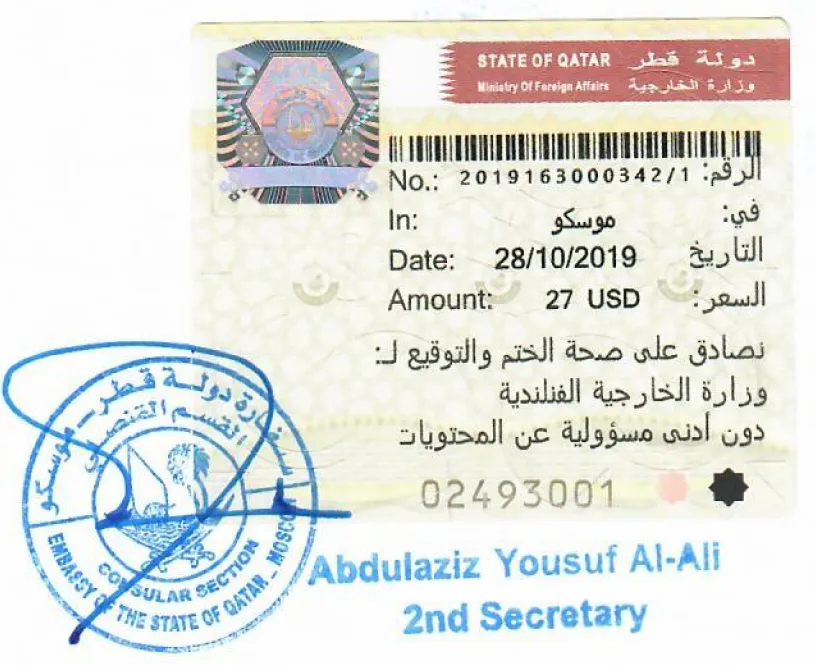
Schmidt & Schmidt covers the full spectrum of legalization services for documents issued in Qatar.
Qatar has not joined the Hague Convention on the Simplified Authentication of Documents. This means that documents from Qatar cannot be legalized by apostille, they will only be recognized abroad after they undergo consular legalization.
Consular legalization is the process of authenticating or certifying a legal document so a foreign country's legal system will recognize it as with full legal effect that is carried out by the diplomatic or consular mission of the country in which the document is to be used.
Consular legalization is more complex, time-consuming and costly than the simpler apostille procedure. Consular legalization requires several pre-certifications before a public document can be certified at the embassy or consulate of the destination country.
It is a common requirement that the document has to be translated into the official language of the destination country before submission to the embassy. It is up to the diplomatic mission to decide about the authentication procedure.
Consular legalization includes confirmation of a document by the authorized bodies of the Ministry of Justice, divisions of the Ministry of Foreign Affairs, and then by the consulate (or consular section of the embassy) of the destination country. It must be remembered that the document will have legal force only in the territory of the country whose consulate stamp is on it.
Not only documents issued in Qatar are subject to consular legalization for their use in other countries, but also documents from other countries for their use in Qatar.
Document Requirements for legalization in Qatar
To obtain a consular legalization for a document in Qatar, the following requirements generally apply:
- The document must be an original or a certified copy issued by the competent authority.
- The document should contain all relevant and accurate information.
- The document must be in the official language of the issuing country or translated into the official language of the country where the consular legalization is sought.
It is advisable to find out in advance the requirements for the legalization of your documents at the Qatari embassy or at the place of submission of documents, especially if you want to legalize non-standard documents.
It is not possible to legalize heavily damaged, unreadable and dilapidated documents, as well as documents with corrections. In this case, you will have to get a duplicate.
Many certificates and other documents have a deadline after which you will have to re-legalize them.
If a document was issued by consular offices abroad, it cannot be legalized. It is necessary to obtain a duplicate of the document, and only then legalize it.
The following documents can be legalized
- Extracts from the commercial register of Qatar
- Criminal Record Clearance
- Certificates of civil status (certificates of birth, death, marriage and divorce)
- Education documents (school reports, certificates, diplomas)
- Judicial decisions
- Notarized copies of documents
- Notarized translations
- Further notarial documents (authorizations, last will, declarations)

Consular legalization of documents in Qatar
To legalize a document issued by the authorities and other authorized structures of Qatar, or executed in Qatar by a notary, and intended for use in another country, it is necessary:
- Check whether the document has the seal of the relevant authority and the signature of an authorized official (for birth certificates - the department or the Ministry of Health; for a marriage certificate - the court or the Ministry of Justice; for a court decision - the Judicial Department or the Ministry of Justice, etc.);
- Certify the document at the authorized service of the Ministry of Foreign Affairs of Qatar;
- Legalize the document at the consulate of the destination country in Qatar
- Translate the document into the language of the destination country if necessary (the translation can be certified by the consulate of the destination country).
Only after passing these procedures will the legalization of the document be completed and this document can be used in the destination country.
Consular legalization of documents for Qatar
Since Qatar is not a party to the Hague Convention on the Simplified Legalization of Documents, documents issued in other countries and intended for use in Qatar are also subject to consular legalization, which usually includes the following actions:
- The document must be translated into Arabic or English by an authorized translator;
- Have the translation certified by a notary;
- Certify the document in the Ministry of Justice;
- Certify the document at the Consular Department of the Ministry of Foreign Affairs;
- Legalize a document at the consular department of the Qatar Embassy.
Consular legalization of Qatar documents for use abroad
To legalize Qatari documents for use abroad, one needs to submit the original document, along with any required copies or supporting materials, to the respective consular office. The consular officials will review the document, verify its authenticity, and affix their seal or stamp to certify its validity.
The consular legalization process may require additional steps like obtaining translations of the document into the language of the destination country or providing additional supporting documentation as requested by the consular office.
It is up to the diplomatic mission to decide about the authentication procedure.
The specific requirements and procedures for consular legalization may vary depending on the regulations of the destination country. However, the basic requirements are as follows:
- The document must be translated in Qatar by a sworn translator and then the original and the translation must be legalized.
- The document must be legalized by the Qatari Ministry of Foreign Affairs.
- The document must be legalized by the destination country embassy in Doha.
Legalization of Qatar educational documents for use abroad
For educational documents issued in Qatar, such as school reports, university degree certificates, transcripts of records, enrollment certificates, and other school or university certificates, to be recognized and valid abroad, they must undergo an authentication process through legalization.
Educational certificates from Qatar must bear the attestation from the Ministry of Foreign Affairs. This is sometimes referred to as attestation, a process that ensures document's genuineness to the receiving institution or nation. For Qatar documents, this typically means undergoing multiple attestations from various governmental departments, both within Qatar and in the foreign nation where the document will be used
Such an approach ensures that educational documents possess the necessary legal authority, allowing them to be recognized and used across various countries. While these are general procedures, the exact requirements may vary, so it is advisable to confirm the specific steps with the relevant authorities.
Since 2016, Qatar's requirements for foreign educational documents have sharply tightened. In order to legalize them, it is necessary to submit a complete package of documents, including the original diploma or certificate, an insert with grades, and a certificate from a university or other educational institution.
Only after going through all the mentioned stages and putting the marks of the listed authorities, the document is ready for submission to the authorities and commercial structures of Qatar.
Some countries in the Middle East (Bahrain, Saudi Arabia, UAE, Egypt, Yemen) broke off diplomatic relations with Qatar in 2017, and after Qatari legalization marks, their diplomatic missions do not put their own legalization marks on the documents.
Consular legalization of a police clearance certificate for Qatar
A Qatar police clearance certificate (is also known as PCC, Character Certificate, Good Conduct Certificate, Certificate of Clearance, Criminal History Record Check, Police Check, No Criminal Record (Certificate of no criminal record), a certificate of criminal non-prosecution) is an official document issued by the Criminal Evidences and Information Department at the Ministry of Interior (MOI).
PCC is needed for various purposes such as immigration, education, employment, applying for residence status, marriage, commercial activities, etc. According to the purpose of the certificate, the applicant must provide various documents. These documents may vary depending on factors such as visa type, current country of residence, and nationality. Typically, it will be needed to provide copies of your Qatar ID or residence card, passport copies, and a recent photograph. PCC is issued by the State of Qatar and valid for 6 months from the date of issue.
Required Documents
- Completed application form;
- A valid copy of your passport;
- A valid copy of your residence permit;
- Original fingerprint document certificate/attested by your country's Embassy;
- Complete addresses and period stayed of all places you have resided in Qatar;
- 2 photographs (4 x 6 cm);
- PCC from your country or Embassy attested by the Ministry of Foreign Affairs and all concerned authorities;
- Offer letter from the employer addressed to the Director of Criminal Evidences and Information Department (CEID);
- Educational qualification certificate (if applicable);
- No objection Certificate (NOC) from the former employer (if applicable).
Certificate of legal capacity to marry in Qatar
Qatar has its own laws and requirements for marriage. Depending on the legal status of the future spouses (citizens or foreigners) these requirements may vary. Therefore, before preparing for your wedding, you should definitely find out what the rules are for getting married in the country, where you want to get married.
To obtain for a certificate of legal capacity to marry, you need the following documents:
- A passport or another identity document;
- Certificates of birth;
- Certificate of divorce or death of your partner if you are not getting married for the first time;
- An official document stating his or her address (this document varies from country to country);
- A declaration of unmarried status.
The required documents will vary based on a specific case, but will in general include either originals or notarized copies with an apostille original of the certificate, or for all non-member countries - a legalized original of the certificate or its notarized copy.
Consular legalization in all cities of Qatar
Schmidt & Schmidt provides consular legalization services for public documents originating from all regions across Qatar. We handle the entire process, from document review to obtaining the necessary certifications, ensuring that your documents are valid and recognized internationally. With our reliable services, you can confidently use your Qatar public documents abroad.
Procurement of documents from Qatar
If the important documents are lost or damaged, or current copies of the documents are needed, the re-issue of the documents is required. It is not unusual for people outside Qatar to encounter difficulties with obtaining new documents when abroad. Our consultants will help you procure new documents from Qatar remotely, and we can arrange for your documents to be sent by courier anywhere in the world.
Certified translation of documents from Qatar
Copies and transcripts of civil status documents can be translated into any language by a sworn translator in Qatar or the translation can be done in the country of destination. We offer certified translations of civil status documents with further certification. The cost of the work is calculated according to the volume of the document in question.

























































